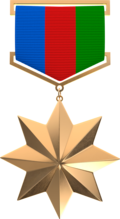Beyler Agayev
Beyler Tapdiq oglu Agayev (Azerbaijani: Bəylər Tapdıq oğlu Ağayev; 3 February 1969, Qarağac, Qubadli, Azerbaijan SSR – 6 August 1992, Lachin, Azerbaijan) was the National Hero of Azerbaijan and warrior during the First Nagorno-Karabakh War.
Beyler Agayev | |
|---|---|
| Native name | Bəylər Ağayev |
| Born | February 3, 1969 Qarağac, Qubadli, Azerbaijan SSR |
| Died | August 6, 1992 (aged 23) Lachin, Azerbaijan |
| Allegiance | |
| Service/ | |
| Years of service | 1992 |
| Battles/wars | First Nagorno-Karabakh War |
| Awards | |
Early life and education
Agayev was born on 3 February 1969 in Qarağac village of Qubadli raion of Azerbaijan SSR. After completing his military service in the German Democratic Republic, he returned to Azerbaijan. In 1990, he entered Azerbaijan State Institute of Civil Engineers. When Armenians attacked the territories of Azerbaijan, he left his education unfinished and voluntarily joined Azerbaijani Armed Forces.[1]
Agayev was single.
First Nagorno-Karabakh War
Aghayev's high ability attracted attention and was appointed the commander of one of the divisions. He participated in battles for the villages of Səfiyan, Yuxarı Fərəcan and Aşağı Fərəcan, Mazutlu, Türklər və Suarası.[2]
On August 6, 1992, Agayev was shot dead while taking part in the battles for Lachin District of Azerbaijan.[2]
Honors
Beyler Tapdiq oglu Agayev was posthumously awarded the title of the "National Hero of Azerbaijan" under Presidential Decree No. 350 dated 7 December 1992. Aliyev was buried at a cemetery in Qarağac village.
A secondary school in Qarağac village of Qubadli raion was named after him.[2]
References
- "1993 UN Security Council Resolutions on Nagorno-Karabakh". 2001-2009.state.gov. Retrieved 14 March 2019.
- "AĞAYEV Bəylər Tapdıq oğlu". ASSOCIATION FOR CIVIL SOCIETY DEVELOPMENT IN AZERBAIJAN. Archived from the original on March 14, 2019. Retrieved March 14, 2019.
Further reading
- Vüqar Əsgərov. Azərbaycanın Milli Qəhrəmanları (kitab)|"Azərbaycanın Milli Qəhrəmanları" (Yenidən işlənmiş II nəşr). Bakı: "Dərələyəz-M", 2010, səh. 86–87.

